BIG RED ATHLETICS
Alumni players who now coach for Big Red
Every year, more than 1,000 students proudly don uniforms, jerseys, singlets and sweaters with "Cornell" plainly visible in athletic competition. They bring their school identity with them to national championships and Olympic trials, while simultaneously preparing themselves for careers in banking and finance, engineering or labor relations.
But some student-athletes catch the bug -- the coaching bug. And some even come home to their alma mater.
Todd Kennett '91, heavyweight rowing
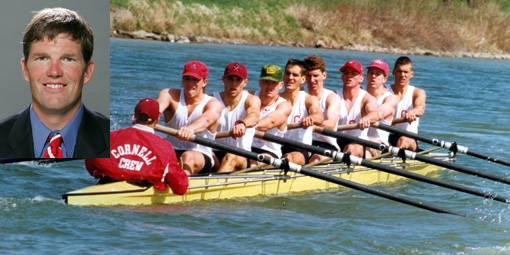
Kennett (third rower from left, in green hat)
After 10 seasons as the lightweight rowing coach, Kennett was named the Spirit of '57 Director of Rowing/Heavyweight Rowing Coach last June. As a freshman in 1987, the idea of becoming a coach, or even rowing for that matter, was the furthest thing from his mind.
But a funny thing happened while waiting for registration in Bartels Hall.
"One of the crew coaches came over trying to recruit my roommate," explained Kennett. "My roommate says, 'No, I'm playing baseball, but my roommate might be interested.' And I said, 'Sure. Whatever.'"
From those humble beginnings, an illustrious rowing career was born.
Under Kennett's direction, the Big Red lightweights won three consecutive Intercollegiate Rowing Association national titles (2006--2008) and two Eastern Sprints titles (2006, 2008) to go along with four top-three finishes. His boats earned four straight invitations to the renowned Henley Royal Regatta, including a pair of runner-up finishes. His 2008 squad became the first lightweight eight-boat to capture three straight IRA titles.
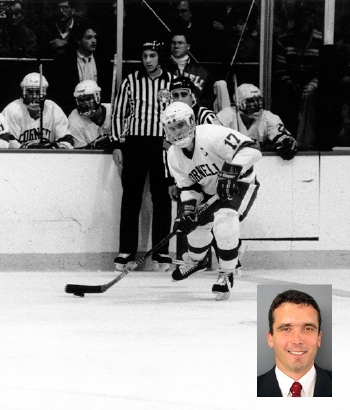
Derraugh
Doug Derraugh '91, women's ice hockey
Derraugh '91, now in his fourth year directing the Big Red women's ice hockey program, was able to see firsthand the magic of Lynah Rink. Derraugh served as hockey team captain as a senior before beginning a professional playing career in Europe. Derraugh returned to Cornell to coach the women's hockey program after then-head coach Melody Davidson left to coach the Canadian National Team.
"When working with our team, I feel like I know more what they are going through," Derraugh explained. "I lived through many of the same experiences and know what it's like to be in their shoes. When I talk about playing at Cornell, I feel like I am able to really explain our proud hockey tradition. I want to help to continue to build that pride."
Jenny Graap '86, women's lacrosse
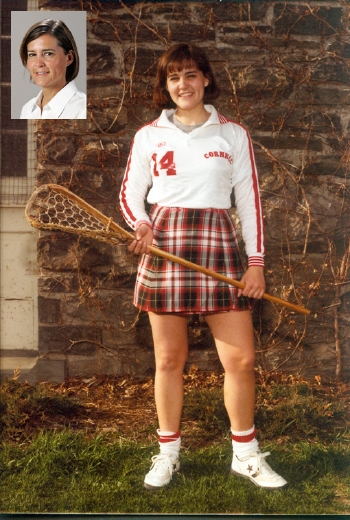
Graap See larger image
When Graap '86 was a member of the women's lacrosse team, things were a bit different than today. Travel? Vans driven by coaches. Uniforms? Don't even ask. An eight-time varsity letter winner who played both field hockey and lacrosse, Graap played in an era when women's athletics were almost an afterthought.
Now, the 2002 Intercollegiate Women's Lacrosse Coaches Association and Inside Lacrosse magazine national coach of the year has built a program that has recorded nearly every first in program history. The first NCAA tournament appearance in women's lacrosse? In 2001. The first NCAA Final Four appearance by any Cornell women's team? That came in 2002. The first Ivy League title in women's lacrosse? That was in 2007.
"The fact that I'm an alumna is important to me every day on
the job," Graap said. "It's the reason why I'm here and not somewhere else. I feel such a sense of pride in the program, and I'm also very invested in my athletes' futures. I care about their education, and I recruit young women who want to attend Cornell first and play lacrosse second."
Jim Knowles '87, football
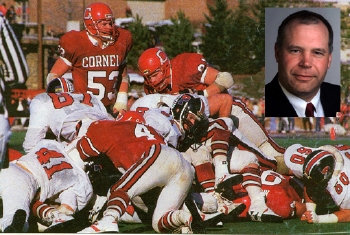
Knowles See larger image
In January 2004, Knowles got off a plane to accept the Big Red's offer ... the other Big Red, the University of Nebraska-Lincoln. With new head coach Bill Callahan taking over one of the nation's most storied football programs, he needed someone to run his defense and special teams, and that person was Knowles. While waiting for the introductory press conference, however, Knowles received a call from Cornell Athletics Director Andy Noel.
"Cornell is one of the most unique universities in everything, including admissions and academics," Knowles said. "From day one, no one has had to teach me anything about Cornell. I know exactly how things are done. It is the easiest transition I ever made. I've been places where I couldn't give a tour of campus by the time I left. Here, I know the place like the back of my hand."
"It's much more than a head coaching job to him," childhood friend and assistant head coach Clayton Carlin said. "From the first day he stepped on campus his freshman year, he talked about how special this place was. When he decided he wanted to get into coaching, he wanted to do it here. He's had this vision since 1988, so it's certainly not just any head coaching position to him. The plan has been in place for a long time ... it's a decision he made long ago."
Bill Walkenbach '98, baseball
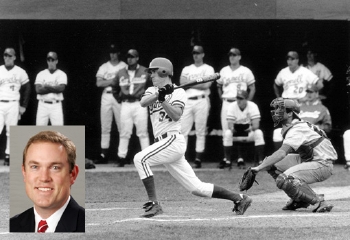
Walkenbach See larger image
The newest member of the fraternity of Cornell alumni to guide their varsity programs, Walkenbach made his baseball head coaching debut in February after longtime coach Tom Ford stepped aside last summer.
Walkenbach is unique among his fellow alumni in that he is the only one coaching with the man who coached him during his playing days, as Ford will serve as associate head coach. The relationship that was forged during the recruiting process out of high school helps to ensure a smooth transition from one era into the next.
"As an alumnus, I hold the university very near and dear to my heart," Walkenbach said. "Ithaca and Cornell have become a second home to me and my wife. When the opportunity to return arose, it was a no-brainer for both of us. We love the Cornell community and everything that Cornell represents. It is a great place to raise a family and a fantastic place to work."
Mike Schafer '86, men's ice hockey
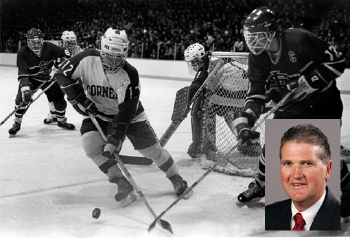
Schafer See larger image
The longest-tenured coach of the group is men's ice hockey coach Schafer, who took over the Big Red a decade after his playing days ended. Like so many others in this group, Schafer honed his coaching skills as an assistant at Cornell before departing, only to return to East Hill.
When Schafer took over the Big Red, his arrival paid immediate dividends. He became the first Cornell hockey coach to lead the Big Red to a league title in his first season, a full decade after he won its last league crown as a senior captain in 1986. Fast-forward 14 years, and Schafer now holds the most victories of any coach in the storied program, surpassing the legendary totals of Ned Harkness and Dick Bertrand '70.
"I think that anybody who gets into coaching always hopes they might get a chance to coach where they played," he said. "Coaching is a tough profession from that standpoint, so I feel very lucky that the opportunity came, and I was able to capitalize on it."